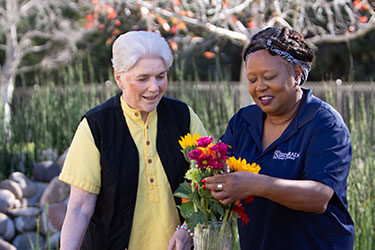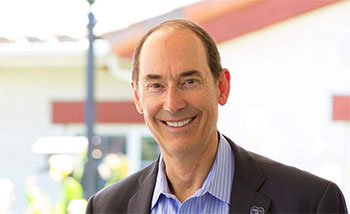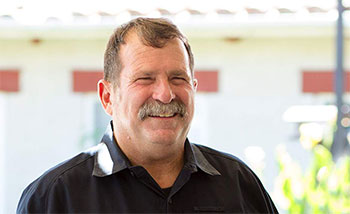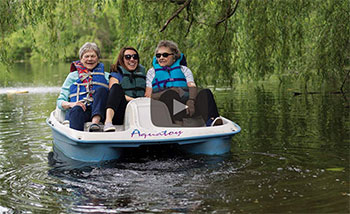New Possibilities in Memory Care: The Silverado Story

A Unique Journey, Bringing Dignity, Care and Quality-of-Life to Memory Care
“New Possibilities in Memory Care: The Silverado Story,” by Loren Shook and Stephen Winner, is the remarkable story of the Silverado journey in the field of long term care for the memory impaired. Founded by Shook and Winner, Silverado has grown to become a national leader in the field. “New Possibilities in Memory Care,” tells the story of how their unique approach offers the memory impaired, the dignity, care and quality of life they deserve.
Alzheimer’s disease, the most common form of dementia, is a progressive mental deterioration that can occur in old age. The number of people age 65+ with dementia will increase more than 40% in the United States during the coming decade, according to the Alzheimer’s Association. Although there is no cure, new studies show there are techniques and methods to enhance the quality of life and slow the progression of the disease.
Find Out More
Praise for New Possibilities in Memory Care
"Loren Shook and Stephen Winner show us that memory impairment doesn’t have to mean the end of life. At Silverado, it means a new stage of life based on love not fear. By replacing restraints, drugs and sterile surroundings with a cozy home, clubs, animals, and children, the “Silverado Way” makes it possible for people with cognitive impairments to live full, engaged lives again, with dignity and purpose. This story is an inspiration – simple but revolutionary. Millions will benefit if this incredibly humane vision becomes the norm."
"In their book, Loren Shook and Steve Winner make the compelling argument that providing meaningful care to those with Alzheimer’s and other memory-impairing diseases should rank alongside research into prevention and cure of the conditions as a top public priority. This is an important book and recommended reading for all who are concerned about the issue."
"The Silverado experience is such that each resident, (not patient), is treated with respect, dignity, and love. There are things beyond just being safe and living longer that are important. Every person my husband encountered was so caring and kind. There was support not only for my husband, but also for our entire family. We were still in his life, not just visitors to his life. When it came time for him to leave this earth, the entire staff surrounded us with support and love. He never had to go to a hospital, and died peacefully surrounded by the ones he loved. Who could ask for more?"
"In 1993 when my stepfather developed Parkinson’s, we were unable to find a home that understood the needs of individuals with dementia. We settled on a community that was clean and safe but had no dementia experience. Three years later Loren Shook, Steve Winner and Jim Smith approached us about an entirely new concept – an assisted living that focused on improving quality of life for individuals with dementia. They had developed a care model that was focused on social interaction and participation, enabling the reduction of resident medication levels. Twenty years later, Silverado has brought life to tens of thousands of early- and late-stage dementia patients. Eventually, my mother developed Alzheimer’s and spent the last two years of her life at Silverado where she was able to enjoy life again as she visited museums, music performances, and even a USC football practice. Even with an advanced illness, she was able to participate in life – all while her family knew she was safe and loved by the Silverado team."
"This book puts into clear perspective why those of us involved in the field of human aging – from scientists to caregivers – do what we do. It truly is all about displaying compassionate understanding in the face of the great changes that come with older age and skillfully providing older adults with the environment and support that they need to maximize well-being in later life. Memory-impairment is one of the most difficult and heartrending challenges that can accompany aging, but Loren Shook and Steve Winner have shown us the importance of never letting our fears overwhelm our ability to provide loving care to those who need it most. Their story and their philosophy are an incredible inspiration to all of us who strive to make the world a better place for older adults."
"This is a story of creating extraordinary results. Silverado is about living to our fullest, knowing “and” is more powerful than “or” – just as love is more powerful than fear. Any leader exploring how his or her organization can achieve more will find this easy-to-read story of innovation, courage and conviction to be inspiring and useful."
Preview a Chapter of the Book
Please enjoy this preview of the first chapter of "New Possibilities in Memory Care: The Silverado Story."
Interview - Loren Discusses the Book
More than twenty years ago Loren Shook and Steve Winner combined their dreams of a better type of care and formed Silverado. Now, two decades later, their dream has become a reality and helps thousands of people living with memory impairment every day. Loren recently sat down to share his insight as a memory care visionary, discussing Silverado, the state of care and a range of related topics.
What was the impetus for starting Silverado?
The desire to create Silverado came from a number of experiences. One was my own experience searching for care for my dad many years ago. It was disappointing because the options were mediocre at best. I knew there was a better way, but at the time I did not have the resources to change that. Another was my experience growing up at my Uncle and Aunts psychiatric hospital where I saw what was considered state of the art memory care at the time. After I learned about the assisted living industry I felt compelled to do something about the memory impaired population, which I thought was misunderstood and not receiving the dignity, care and quality of life they deserved! As a child, my mother always told me that God had a purpose for me and that it was my job to find out what it was. I feel that my purpose is to serve those with memory impairment. People should have better services and quality of life than my father had!!! This drove me then and it drives me today.
I knew that with great people, passion and the courage to persevere through the obstacles, we could make a difference in the world. We felt that people with dementia should be cared for with dignity and respect. We knew that we could fulfill that need by, first and foremost, committing ourselves to enriching the human spirit. Today, 20 years after starting the company, I'm proud that our team has helped define for our industry what’s possible in memory care and make a difference.
How has the field changed since Silverado was launched?
Today we know more about what’s possible in memory care than ever before. For example, researchers now know that there are steps we can take today to help slow the progression of dementia and even delay its onset. Researchers and treating professional have much better resources to diagnose dementia than before. At Silverado, we are focused on implementing findings from this research, furthering our effort to enhance quality of life for people with dementia and their families. It is reassuring to see scientific evidence today supporting what Silverado programming was providing when we opened our first community in Escondido, California in June 1997. It is also energizing for all of us to add new components to our programming based on this information and actually measure results we are getting with our residents! Innovating memory care has always been at our core — from the programming we implemented when our very first community opened, to our new Nexus program for people in early to mid-stages of memory impairment today.
What are some of the biggest misconceptions people have about senior care?
One of the biggest misconceptions about senior care – particularly memory care — is that a dementia diagnosis is the end of a meaningful life filled with purpose. We have proven this myth to be just that, a myth, thousands of times over the past 20 years. One of the first things we do when a new resident moves into a Silverado community is to get to know them as an individual. This allows us to cater to their interests, and help them reconnect with their life’s passion. We have countless stories. From the former Spanish teacher who reconnects with teaching by leading a class for residents, to the artist who continues his craft and then hosts a public exhibit — our goal is to truly enhance quality of life for those affected by memory impairment.
You have a book coming out, how would you describe it?
The purpose of this book is to give hope to families affected by Alzheimer’s and other memory impairing conditions. It’s also to help educate the healthcare community about what’s possible in memory care and address some of the difficult problems that are often faced by people who are dealing with memory impairing disease. Families and professionals don’t know what they don’t know, but once they understand what CAN be done to serve people with dementia, they can demand better care within their own communities. This book includes a collection of resident stories — successes that have resulted from being in the Silverado environment, where a unique culture of acceptance and love exists— that exemplify what we have learned over the past 20 years and how families, and their loved one can benefit from that knowledge. The second edition further speaks to the stigma of the disease, broadening the discussion about how it affects children and families. It also addresses end of life matters.
Who is the book primarily for?
This book is for those looking for a place to turn when faced with the difficult emotional task of caring or finding care for a loved one with dementia. It’s for individuals who alongside us, would also like to see the world change the way it cares for and perceives people with cognitive decline — a world where we eliminate completely the stigma attached to memory impairing diseases. Silverado is a purpose driven company and our purpose is to change the world. This book is a tool to tell the story of what quality of life can be with a memory impairing disease. Someday there will be a cure for Alzheimer’s Disease and other memory impairing conditions, but until then we at Silverado are committed to partner with like-minded professionals and caregivers to make a difference in the lives of those people who have this affliction and their families. What we saw in the earlier days was a lack of understanding and appreciation for what someone with a memory impairment could do. People suffering from memory impairment never lose the desire to love and be loved just like you and me.
What are the main points you would like readers to come away with?
A family once shared with me that finding Silverado was like finding a lighthouse in a storm. That’s how I want people to feel after reading our story. I want them to feel hope — and to know that a dementia diagnosis is not the end. Another family member told me that, before finding Silverado, she tried to get another community to improve in how they were caring for her mother. When they were unwilling to change, she moved her mom to Silverado where she quickly became more alert and responsive! I want people to feel empowered with knowledge, and to know not to accept the status quo.
A high-level banker toured Silverado in Scottsdale and received a copy of the book. When flying back to the East Coast he started reading it and was moved to tears. Even though it was a Friday evening, he got off the plane and sat in the terminal to finish reading it. He then went into the office on Monday, insisted that each of his bankers read the book and shared with them that ‘this is the type of company we want to finance!’ A number of CEOs and senior leaders at assisted livings have read the book and then bought copies for their leaders, making it required reading and holding discussions on how to implement some of the ideas. Recently, at a national investor conference, a man stopped me in the hall to express his gratitude for the book and thank me for the Silverado model of care. He was about to open his 20th community in South America serving the memory impaired by copying what we do.
While researchers remain committed to finding a cure, we continue to provide individuals with the best quality of life possible by seeking and implementing new innovations in care and achieving an even better quality of life for both the person suffering from the disease and the their family. I hope that when families read our story, they feel empowered not only to seek the right help, but to take some of what we have learned and incorporate it into interactions with their own loved one. I hope that it serves to fan the flame of innovation in others who seek to join us in our quest to change the world in how the memory-impaired are treated.
How do you see elder care changing in the next decade?
For starters, we are in a growing industry. As baby boomers retire and the population ages, dementia is going to become one of the greatest challenges of our time. Too many people think of a bad experience they had as a child, visiting grandma in a scary, smelly nursing home of 35 years ago. As more and more people gain experience with good senior housing operators, they will begin to see the difference the right environment can make on an elderly persons quality of life. I want everyone to know that there is scientific evidence that social isolation of the person suffering from memory impairment actually exacerbates his or her cognitive decline. Add to that depression, malnutrition, lack of stimulation, and it gets even worse. This does not need to happen in 2016, but to change the trajectory we have to lose our fear of what all too many people experienced as a child.
While it’s my hope that researchers do indeed find a cure, we must address it until then. In fact, the book also touches on the importance of addressing this issue as healthcare changes. For example, rather than bill for number of days in the hospital, insurance companies are now giving healthcare providers a predetermined sum of money based on the patient's condition. This challenges the hospital to seek the right level of care for their patients to avoid constant readmission to the hospital. That’s where elder care providers will be able to help. In fact, we are currently part of a pilot program in which a hospital sends dementia patients to Silverado for care. So far, it’s resulted in not only a cost saving to the healthcare system, but a better quality of life for that individual. It’s a win-win.








